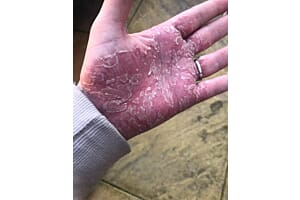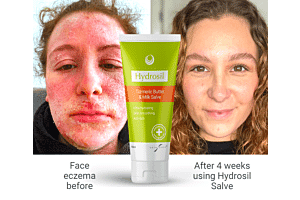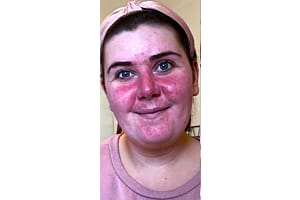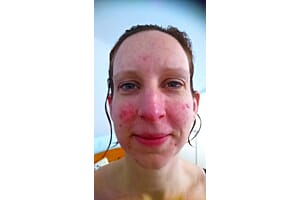We all know that puberty causes spots. But new research has found that its not just teen skin that is at the mercy of acne, adult women are falling prey to acne too and the problem is on the rise.
Many women who did not even get acne as teens, are going on to develop acne in their adult years.
[quote]But some of the causes of adult acne are caused by modern lifestyles and beauty trends. A rejection of the contraceptive pill in more recent years, and increase in salon facials and peels and higher stress levels of career women are all contributing to a rise in adult acne in women.[/quote]
New research presented atAmericanAcademyof Dermatology's 70th Annual Meeting claims that dermatologists are finding that late-onset or adult-onset acne is becoming increasingly common in women in their 20s, 30s, 40s and even 50s.
A study examining the prevalence of acne in adults over age 20 found that acne affects more than 50 percent of women between the ages of 20-29 and more than 25 percent of women between the ages of 40-49.
The study found a disproportionate number of adult women were affected by acne compared to similar-aged men.
A 2011 clinical study examining photos of women from age 10-70 for visible signs of acne found that 45 percent of women aged 21-30 had clinical acne, 26 percent of women aged 31-40 had clinical acne, and 12 percent of women aged 41-50 had clinical acne.
Not only is the problem or female acne becoming more complex, so are the solutions. Anti-acne treatments for teen skin are not suitable for adult skin as they dry the skin out and often cause fine dry lines and flaking.
Treatments for acne in later life need to be different again as they must be very gentle on skin as it is thinner and more sensitive with age.
Causes of adult female acne
Androgens
Androgens, the male hormones present in both men and women, can contribute to acne flares by over stimulating the oil glands and altering the development of skin cells that line hair follicles in the skin.
The majority of women with acne have normal androgen levels, but adult women can experience and increase in androgen levels, particularly if they are highly stressed. There is some evidence to suggest that women now working in high stress careers are seeing a rise in androgen levels, which may be contributing to the rise in adult female acne. Other symptoms of excess androgen levels are excess facial or body hair, deepening voice, or irregular or infrequent menstrual periods.
Rosacea
Rosacea is an underlying skin condition cause by vascular dilation, which causes redness and small acne pimples. It is most common in women aged 40+ and is also on the rise.
[quote]Evidence suggests that the daily use of chemical skincare products and cosmetics over several decades could be making skin more sensitive over time, making rosacea an increasingly common skin condition in middle-aged women.[/quote]
The Pill & HRT
For the last 30 years the majority of women were on the contraceptive pill and then HRT. Both these medications help diminish acne.
[quote]However, in recent years, due to scares about breast and ovarian cancers, more and more women are seeking alternative forms of contraception and take on the menopause without the aid of HRT therapy. As a result there has been a re-emergence of acne among adult women whose skin is not being moderated by hormonal contraceptives or HRT.[/quote]
Alcohol
There has been a sharp rise in alcohol consumption among women in the last decade, which some evidence suggests could be adding to the increase in acne amung adult women.
High alcohol consumption can alter hormonal balances in the body, which can contribute to acne break outs.
Beauty products & cosmetics
There has been a boom on cheaply manufactured cosmetics in the last decade which means not only are women putting cheaply manufactured chemicals on their skin, they are doing it more often as products are cheap to buy.
From a very young age women are wearing daily foundations and cosmetics on their skin, many of which contain chemicals which can eventually cause the skin to build up an intolerance, causing rashes, dermatitis and acne like spots in adulthood.
Shampoos & hair products
Cheap chemical foaming agents called sulphates and strong perfumes in most, low budget shampoos can cause facial and neck skin to become irritated, causing spots and sensitivity.
Sun creams
It’s a good thing that we are all wearing more sun cream. But with many women becoming increasingly aware of the dangers of UV damage to the face, the use of high factor sun creams on the face on a daily basis is now much more common than 20 years ago.
[quote]Many women, especially those who have had chemicals peels, botox, fillers, surgery or other anti-ageing procedures, opt to wear sun creams of SPF30 or more on a daily basis. While this is great for anti ageing and reduces the risk of skin cancer, it’s a problem for acne.[/quote]
Most low-budget sun creams have chemical filters and are made from thick, greasy formulations which clog pores and can also irritate skin causing acne.
Skin-stripping cleansers
Due to the rise in the use of cosmetics, cleansing has had to become a more industrial process than simply cleaning skin. Make up removers and cleansers that can take off thick foundations are a modern need.
However these cleansers, while effectively cleaning off the make up, also strip the skin of its natural oils, meaning that over the time the skin produces excess oil to compensate, causing a cycle that ends in excess oil production that leads to acne.
Facials & Peels
Facials have become a regular luxury for many women but although they clear the grime out of skin pores effectively, the problem is that those empty pores then fill up again quickly. Dermatologists are becoming increasingly concerned about eth long term damage caused to skin subjected to regular facials and peels.
[quote]Excessive and regular exfoliation can cause something called rebound acne. This happens when the skin is damaged and it tries to repair itself by increasing skin cell production. But these skin cells can block your pores, which causes spots.[/quote]
Chemical peels, known a glycolic peels, which have recently been made available as home beauty treatments, can cause disruptions on the production of sebum, sometimes causing the skin to begin over producing sebum after a peel due to trauma of the peel. In addition these peels can thin the skin, making skin more sensitive and prone to skin reactions and spots.
Facial peels essentially remove the outer layer of skin cells, however these skin cells are not worthless, in fact they act as a vital protective barrier and keep out pollution and act as our skin’s own natural defence to keep acne bacteria at bay. Removing them opens the skin up to greater risk of letting the bacteria in that leads to acne.
Tips for managing Adult Acne
- Always use sensitive skin products in order to minimize skin irritation and reactions that can get infected and lead to acne.
- Cleansers should be used twice a day, once when you get in from work at the end of the day, and once before bed. Cleansers should be water-free, mild and non perfumed
- Remove make up and sun creams as early as possible once in from work to allow the skin to air fro as long as possible per day.
- Daily moisturisers are a must, but should be perfume and chemical free and contain a high levels of anti oxidants to fight the acne bacteria.
- Use zinc based sun creams to guard against greasy pore blockages and bacteria build up
- Avoid anti-bacterial washes containing Benzoyl peroxide as it dries the skin, especially adult skin
- If you suffer from redness and sensitivity, try a skincare range containing non-chemical anti-redness ingredients, such as caper extract.
- Do not have facials more than one a month
- Do have facial massages as often as possible
- Exfoliate regularly to clean pores, but do NOT exfoliate with abrasive exfoliants any more than once a week. Use a perfume and chemical free fine exfoliant for sensitive skin, preferably with a natural anti-bacterial ingredient in it.
- Avoid topical antibiotics if possible as they kill off the ‘good’ bacteria on the skin’s surface which help keep skin healthy and guard against over population of the skin’s surface with bad bacteria that leads to acne.
- Older skin scars more easily from infected acne lesions because it’d thinner, so popping and squeezing of spots should be completely avoided
- Try meditation techniques to reduce stress levels if in a high stress job. Or do 30 minutes of stress busting, and preferable outdoor exercise at least four times a week to reduce stress levels.
- Switch to non-perfumed and if possible natural shampoos so that they do not irritated the skin when running over the face or when sleeping on hair at night. Try and always tie hair back at night.
- Wash pillows with washing agents for sensitive skin, preferably use a natural washing agent for bedding.
- Cut down on alcohol generally, but try to avoid drinking alcoholic drinks three hours before sleeping and always drink a glass of water before bed if alcohol has been consumed.







